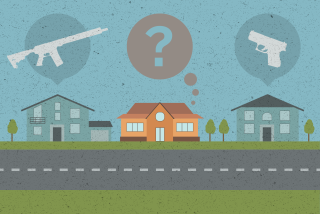Many kids with suicide on the mind have guns in the home
More than 17% of children considered to be at risk of committing suicide have guns in the home that could make a passing destructive impulse deadly, and between 15% and 30% of those adolescents told researchers they had access to those guns, to bullets, or to both.
Those figures, presented over the weekend at the American Academy of Pediatrics’ annual meeting, underscore a growing interest in pediatricians in weighing in on gun violence and its toll on children. The new research was unveiled during a session of the physicians’ confab devoted to understanding the role of violence in media, the challenge of recognizing which kids are potentially violent, and what role guns play in the death and injury of children.
Suicide is the second-leading cause of death among young people between the ages of 10 and 24 in the United States, and half of those who succeed in taking their lives use a gun.
Researchers from three cities conducted structured interviews with 524 emergency department patients between the ages of 10 and 21. Roughly 29% of those young people -- 151 participants -- answered questions about suicidal thinking and thoughts of self-harm in ways that identified them as “at risk” for a suicide attempt. And 17.2% of those -- 26 youths -- told interviewers they were aware of having a gun in their home. The average age of those with guns in the home was 14 years old.
Four of those youths said they had full access to the firearms and to ammunition. But twice that number told interviewers they could gain access either to the gun or to bullets.
“While many youth who kill themselves have mental health disorders, up to 40% of youths who kill themselves have no known mental illness,” said Jeffrey A. Bridge, co-author of the study and a youth suicide expert at Ohio State University.
“This study underscores the importance of parents understanding the risks of having guns in the home,” he added. “Being at risk of suicide and having access to guns is a volatile mix,” he added.
The role of impulse in youth suicide has been well established in a number of studies. In one study of patients between the ages of 13 and 34 who attempted suicide that came close to being lethal, one-in-four told researchers they deliberated for less than five minutes before undertaking the act. And almost half said they contemplated committing suicide for less than an hour before attempting it.
And the role of firearms in boosting suicide rates is clear from at least a dozen studies, which find that not only does the presence of a gun in the home make a suicide attempt more likely; if attempted, it makes the likelihood of a completed suicide a near-certainty.
Bridge’s research team has focused their work on devising a screening tool that could identify youths coming into a hospital’s emergency department who are at risk of committing suicide. Past efforts to assess a young patient’s propensity toward self-harm have been lengthy and of varying accuracy. The team conducting the current research started with a 17-item questionnaire, which they used to develop a four-question screening tool that assesses not only a patient’s inclinations but also whether they have access to means.
Physicians interested in warning parents of children against having a gun in the home have run afoul in recent years of legislation in some states that could make asking about gun access illegal.







